It’s near dawn at Fort Meade, a sprawling army base 30 miles north of Washington D.C. The sky is hazy and the air is a crisp 37 degrees, just cold enough to see your breath. A group of junior Navy cadets straight out of boot camp cycle through calisthenics under the lights on a muddy football field. They bark out their jumping jacks — 1! … 2! … 3! … 4! … 5! — until a bugle call drowns them out.
The base is coming alive. Traffic picks up. Joggers in baggy sweats shuffle by. Recruits in hoodies make their way across campus. Some head to the dining hall, others to the gym, the Gaffney Fitness Center, where Rachel Heck already is hard at work. She slams a medicine ball to the floor, creating a thump that echoes off the walls.
Air Force 2nd Lt. Heck is here early today, confined to a corner of the gym with two friends. There’s little time to waste. Two hours later she’s on the other side of campus, wearing her Operational Camouflage Pattern uniform, saluting colleagues and walking into Defense Information School amid the nearby marching of military cadence. Heck plops down in the second row and takes out her notebook.
Today’s schedule is scribbled on the board:
9-10 — Wing PA superintendent panel
1010-11 — PA deployment process
13-1420 — Crisis response workshop
For years, Heck was destined to be golf’s Next Big Thing, a well-spoken marketing machine who wins tournaments and moonlights with the Air Force. Ten months ago she capped a rollercoaster collegiate career by running into the arms of her teammates, having just secured the clinching point of an NCAA title. In four years at Stanford, she’d racked up nine wins, two NCAA team titles, one NCAA individual championship and an Annika award, which is given to the top female golfer in Division I. Before she even left college she was a regular at the Augusta National Women’s Amateur and played in five majors.
But golf is no longer Heck’s life. In fact, she rarely plays it. She gave up the game — at least in the most serious, professional sense — a year ago when she announced she would remain an amateur, trading a life of world travel and trophy chasing for one of relative normalcy and tranquility, for one of freedom, for one that has brought her here to Fort Meade in the middle of winter with a clear mind and no regrets.
And the strangest part? She’s loving it.
* * *
RACHEL HECK ALWAYS DREAMED of becoming a professional golfer.
Her dad, Robert Heck, was a college football player who now is an orthopedic surgeon, but he got hooked on golf during his residency. Years later, after Robert and his wife, Stacy, had three girls and they planted roots in Memphis, Tenn., they established a routine. Robert would finish work and bring the girls to the course for a few hours for friendly competition. The prize at the end was always ice cream. Soon, the girls were hooked, too.
Abby, the oldest, won two individual state championships and graduated from Notre Dame with the third-best career stroke average in program history. Anna, the youngest, won a state title and is now a sophomore on the Notre Dame women’s team. But the middle child, Rachel, excelled on a different level.
She was good at other sports like soccer and gymnastics, but she lapped her competition on the golf course. Her parents knew she had talent, but they didn’t understand how much until 5-year-old Rachel entered a lighthearted three-hole event. Rachel got to the greens so much faster than her peers that she started to cry, assuming all their extra shots meant they were skipping her turn. She was winning before she even knew what it meant.
As Rachel got older, her competitive spirit only grew stronger — a trait she inherited from her father. Rachel always admired his work ethic and discipline. He’d hit the gym twice a day, work and still find time to spend hours at the golf course with his kids. A few years ago he taught himself Spanish to better connect with some of his patients.

“My dad really instilled in me that there are 24 hours in the day, and how are we going to make all of them count?” Rachel says. “You can play hard, but you gotta work hard. I didn’t know anything else other than, I’m gonna work my butt off. That’s what he did.”
Rachel missed out on normal-kid things like sleepovers and summer camps. She practiced until dark. She skipped weekend activities with her friends and spent all day at the golf course. Rachel begged her parents to send her to a golf academy but they declined; they were happy to support her passion but also saw the value in a more conventional high school experience. It all paid off: Rachel became a five-time AJGA Rolex All-American, four-time individual state champion and two-time high school golfer of the year. As a high school freshman, she won the Tennessee State golf tournament by fifteen, finishing 10 under for 36 holes.
At 15, Rachel played in her first major, earning a final-round pairing with Lexi Thompson at the 2017 U.S. Women’s Open. Both shot 72. Rachel tied for 33rd, sharing that spot with Anna Nordqvist and Lydia Ko. She beat Nelly Korda by four. Major starts followed in each of the next two years.
But in the fall of her senior high school season, everything changed. Rachel suffered a back injury and had to take off a couple of months from the game. For the first time, she didn’t have golf and struggled finding ways to fill that void. She battled depression. She felt as if she’d lost her joy.
“I was questioning, Who am I without this game?” she says. “And that was the first time I ever really thought about that. Since I was 3 years old, I said I was going to be a professional golfer. I felt super empty and I wanted to find something away from golf, something that felt like my own.”
Then one day, she had an epiphany.
“Golf is so individual, so I thought, What’s the opposite of that? What’s something where I’m a small part of something so much bigger than myself?“
* * *
IT’S JUST PAST NOON ON A WEDNESDAY AT FORT MEADE, and there’s a crisis in room 219. A Chinook and HH-60 helicopter collided during a routine training exercise. Now a pair of small teams, just briefed on the scenario, scramble to coordinate an action plan.
None of this is real. It’s a crisis response workshop for students training to become Public Affairs Officers (or PAOs), but good luck telling Rachel Heck that.
Heck walks up to the front of the room. As the spokesperson for the assignment, she consults with her team and scribbles on a whiteboard littered with acronyms. AETC. SAF. CAT. DAO.
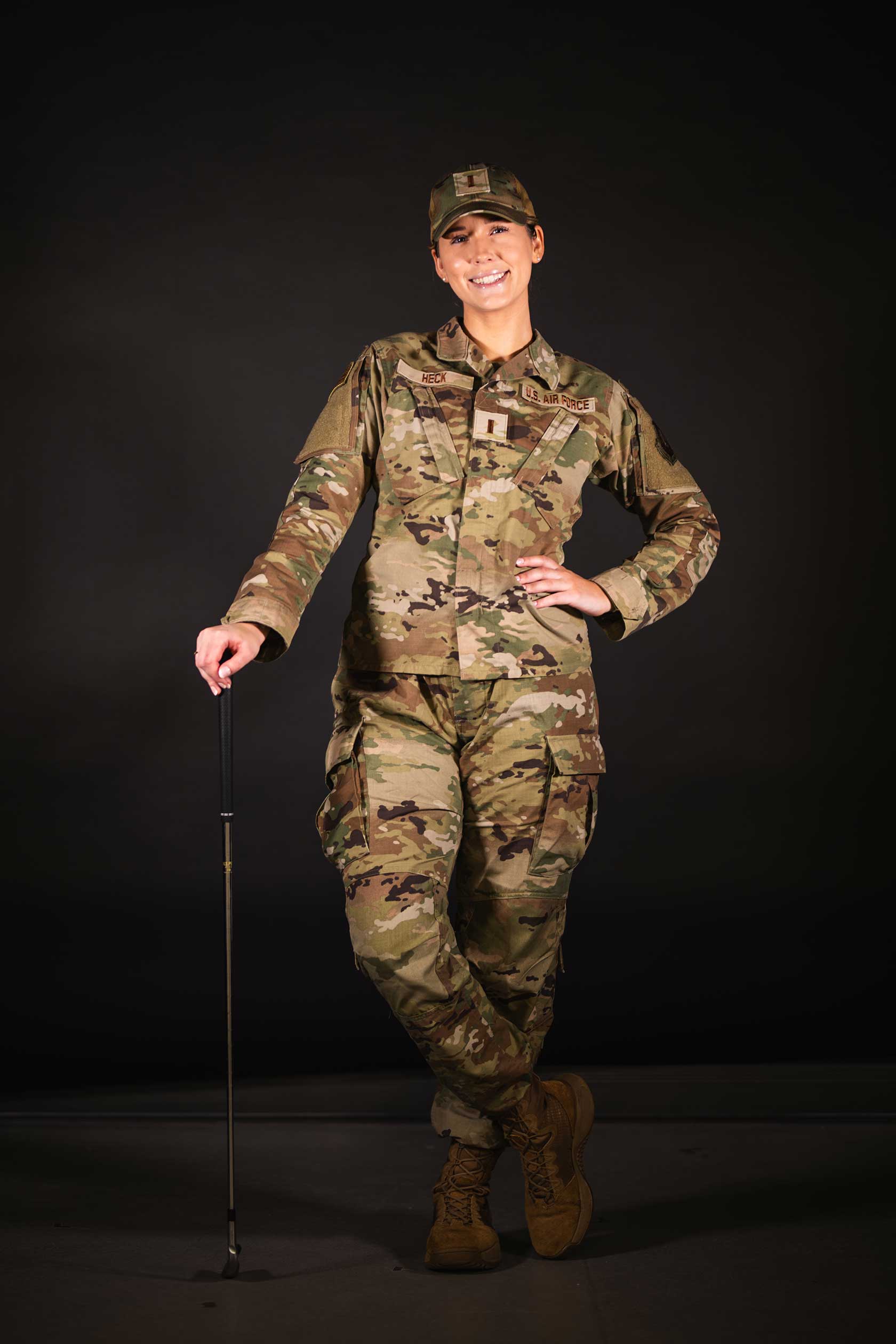
They work fast because they have to. There’s much to sort. They need to figure out which major command oversees the incident, who should communicate first and where to find information. Then they need to create a timeline and determine priorities. The incident release and the holding statement? The public announcement? A press conference? Notifying the next of kin?
This is Heck’s seventh of 10 weeks at Defense Information School. She has class from 9 a.m. to 4:30 p.m. five days a week — lectures, panels and activities — and stays at the Candlewood Suites a mile away. (To the best of her knowledge, she’s the only hotel resident with golf clubs and who kills time putting to the leg of a desk chair.) She’s learning skills like communication strategies, crisis management and relationship management. When she leaves Fort Meade as a PAO reservist, she’ll be required to spend a weekend a month at the Los Angeles Air Force Base. The rest of her time will be spent as an analyst for KKR, a private equity firm in downtown San Francisco.
While Heck’s journey away from pro golf happened only recently, her road to the ROTC and the Air Force started in high school, after the back injury that caused her to miss part of her senior-year golf season. She had a couple of friends in ROTC and appreciated what the commitment represented. Her parents were less sure. How could she balance military training with academics and a commitment to Stanford’s women’s golf team? Ultimately they approved. Stanford coach Anne Walker also allowed it.
Heck admits she entered ROTC uncertain of whether she’d actually finish the program, but she quickly fell in love with it. The people, the values, the professionalism, the excellence, the community, the grit — all of it spoke to her in a way that golf did not.
“What coach Walker found was that Rachel actually thrived in ROTC,” Heck’s mother Stacy says. “She was a happier, more productive kid with it, so she was never going to take it away.”
Rachel graduated from Stanford in June 2024 with a political science degree and was commissioned as a Second Lieutenant of the United States Air Force. She spent her summer in San Francisco and New York City, where she did her analyst training, and most of her winter in Fort Meade.
Golf quickly became an afterthought, but that didn’t mean it retreated into the shadows. Heck has 28,000 Instagram followers where she has posted a half dozen photos posing with NCAA trophies. Her new friends at Fort Meade noticed — then saw her talent firsthand, thanks to an impromptu TopGolf visit.
One of Rachel’s best friends, Courtney, introduces her to others by saying, “She’s a famous golfer and she won’t tell anyone.”
“People see a highlight reel of my life on Instagram, and it just seems like I had it all together all the time,” Heck says. “But I so did not. There were lots of tears, a lot of stress, a lot of late nights. But each time I feel like I got stronger.”

* * *
HECK ARRIVED AT STANFORD IN 2021 ON A HEATER, winning the first collegiate tournament she played, the first of a record six victories during her freshman season. Her game peaked at the right time, and she became just the third woman in NCAA history (and the first in Stanford golf history) to sweep the postseason, winning the conference, regional and national individual tournaments. Before she’d turned 20, Heck had become one of the most decorated players in the history of the world’s most decorated college program.
Despite missing some of her sophomore season with mono, Heck still won twice, helped Stanford to an NCAA team championship and signed Nike Golf’s first-ever NIL deal. Heck’s profile was soaring, sponsors were flooding in and the pro game beckoned. She held the golf world in the palm of her hand.
And then during one October round in 2022, Heck couldn’t feel her hand. It went numb, the blood vessels started to swell and suddenly she could hardly grip a club. It was painful, and she was scared.
She hit one out of bounds and shanked another. Pain, tears and anxiety followed. Her coach told her to withdraw, but Heck refused.
“There’s an Air Force quote I really love by Maj. Lisa Jaster,” Heck says. “It’s one of the quotes we memorize in ROTC: There’s no quitting. I can’t have quit in me. There was never an option to stop, to quit.”
The soreness had first started in September as a dull ache. Trainers chalked it up to muscle tightness. They changed her practice routine to try to minimize the discomfort, but the pain was excruciating at that tournament in October. That night she went out to eat with her parents and couldn’t hold her fork.
It got worse. The pain climbed up her arm. Even carrying a backpack was miserable. Eventually her father helped uncover the diagnosis: thoracic outlet syndrome, a condition in which nerves or blood vessels between the neck and shoulder are compressed, leading to pain in the neck, shoulder, arm and hand.
Heck tried physical therapy, even a Botox injection, but it didn’t help. Surgery was inevitable. Her first rib was removed in March 2023. She played only 10 tournament rounds her junior season.
“It was just such a rollercoaster, really high highs and then pretty low lows,” Stacy says. “It was never just boring.”
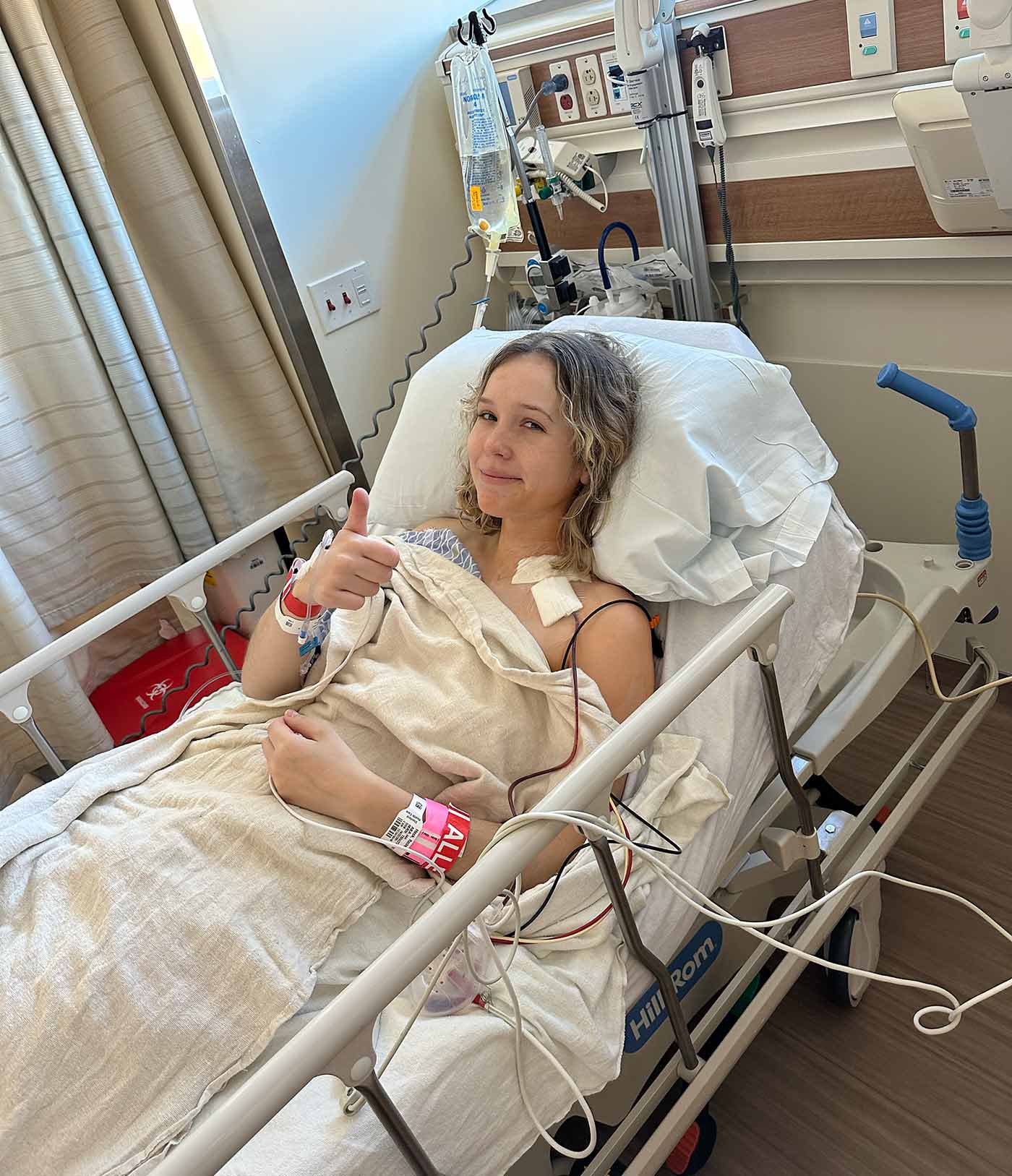
Heck’s breaking point came a few weeks later, when Stanford was getting ready for spring break. She was still in pain from the surgery, which kept her out of that year’s Augusta National Women’s Amateur. She went to ROTC and golf practice but couldn’t participate in either. She was frustrated and hurt and sad and angry. She called her mother late one night in tears.
“I’ve had enough,” she said. “I can’t do it anymore.”
The next morning Heck booked the earliest flight home to Memphis. She couldn’t wait to see her parents and her black lab, Scout. It was a brief reset at home but an important one. Something had changed within her.
“You’re not supposed to be able to handle everything on your own,” she says. “It’s OK to break sometimes. You have to break to be able to build back up.”
Heck’s body wouldn’t let her compete in the Augusta National event, but she decided to attend anyway to support her friend and Stanford teammate, Rose Zhang. Heck walked every step at the ANWA with Zhang, who won the tournament. Heck called it one of the best weeks of her life.
“I learned that I’m happy without golf,” Heck says. “I wanted to play really badly, and that contributed to being so mentally miserable before that — I wanted to be out there as part of the ANWA. But just being out there, being around the people I loved, I realized I don’t need to have a golf club in my hand to be happy.”
Zhang singled out Heck during her winner’s press conference.
“I’m just so inspired by her constant demeanor and her mindset on recovering and her ability to just have such a positive outlook on things, even when things are very hard,” Zhang said. “No one knows what she’s actually going through except for herself. For her to actually come out and watch me and be so selfless and just supporting me, it really shows how incredible she is.”
Later that summer, Heck spent 18 days at ROTC field training at Maxwell Air Force Base in Alabama; she was tested on weapons, physical conditioning and survival training. A week later, with little time to practice, Heck played in her first significant event since her surgery, the U.S. Women’s Amateur at Bel-Air Country Club in Los Angeles. She won four matches and advanced all the way to the semifinals. Her comeback was the talk of the tournament.
* * *
HECK STILL CAN’T PINPOINT THE EXACT MOMENT when she decided to say “no” to pro golf.
She made the call sometime during the fall of her senior year, but it was the result of a steady simmer rather than a boiling point. The moment at Augusta with Zhang; the injury her junior year at Stanford and the slow realization that life on the road and in the public eye wasn’t appealing and certainly not fulfilling — it all added up to something. Then there was Heck’s older sister, Abby, who went from the Notre Dame golf team to medical school. Abby had always been a proponent of her younger sister pursuing something outside of golf. Success didn’t have to take the most obvious path.
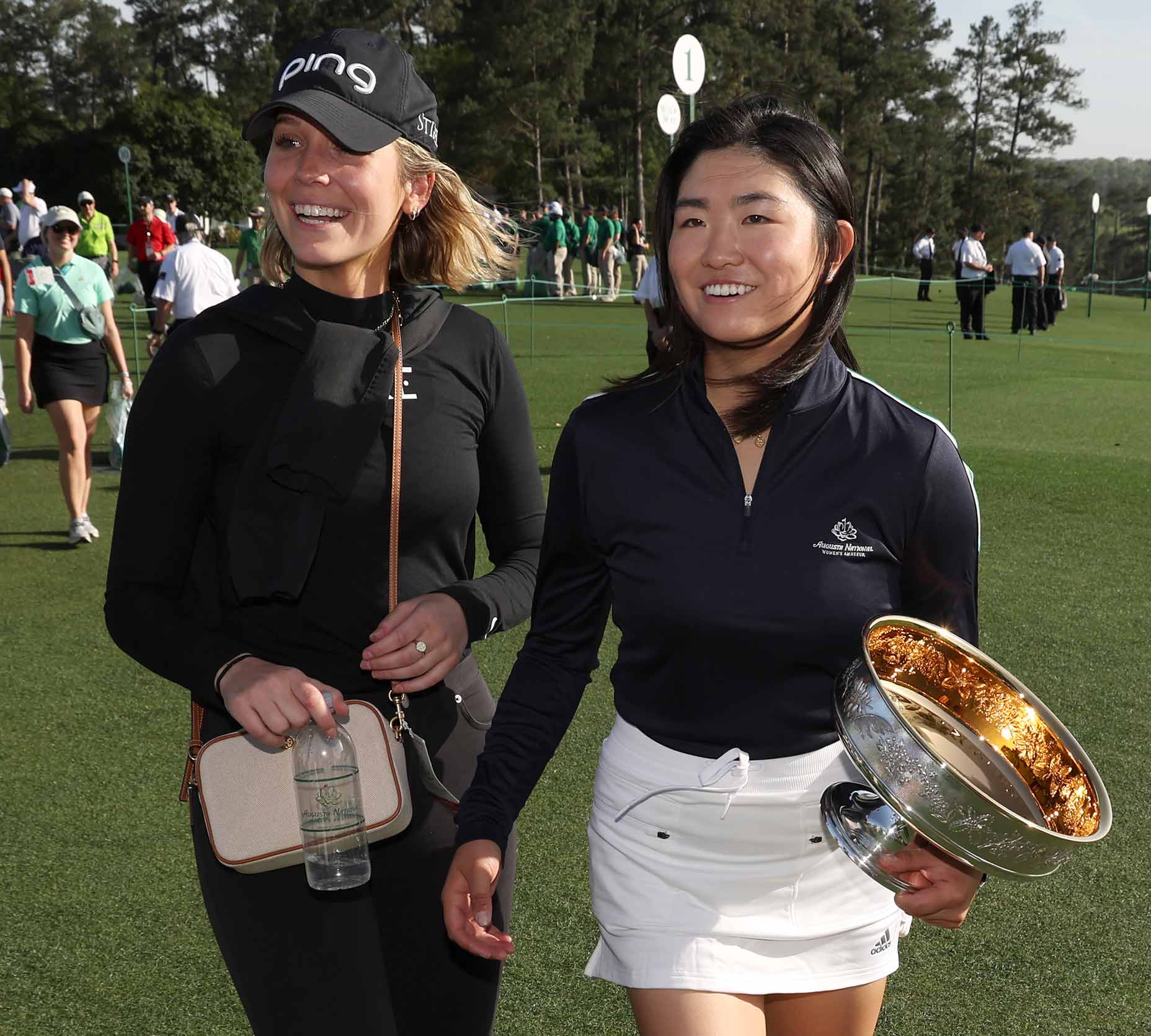
“It’s like I was going to be a golfer, and that was it, and there weren’t any options besides that,” Heck says. “So it was taking a step back and realizing I have free will. My life is in my own hands. I can do whatever I want.”
What’s ironic about Heck’s story is that injuries she suffered never actually prevented her from turning pro (she’s won since her surgery) but instead gave her a glimpse of what life might be like without relentlessly pursuing golf — and she liked it.
Heck’s senior season was marred by a slow recovery following surgery, and her coaches and trainers tried to limit her reps to save her for the postseason. The ANWA was one of her final events of 2024, and a week before it she sat down and penned a first-person piece for No Laying Up, titled “Rachel Heck: Why I’m Remaining An Amateur.”
Heck says it was important to write the story herself. She cried as she typed parts of it, like the memory from her first U.S. Women’s Open with her father, when he was caddying and walked up to her on the practice green and said, “I don’t know what I’m doing; I just want to be next to you.”
She missed the cut by a stroke at the ANWA but a month later proved what she can do when healthy. She won the NCAA regional tournament by four shots — eight under over 54 holes — and helped Stanford advance to the NCAA championship against UCLA, which would be Heck’s final collegiate match.
Walker put Heck in the anchor position; if anyone had earned the right to secure the deciding point, the coach reasoned, it was her. Heck couldn’t sleep the night before her match; she woke up at 3 a.m, her mind racing with nervous excitement. She was scared out of her mind, she said, right up until she teed off. Then she felt calm and in control. Nine years earlier she had watched Stanford win nationals on TV and told her parents, “That’s going to be me one day.” Now she was in that same situation for the final time and soaked up every second — and her game was as dominant as ever. Long and straight and precise and powerful. Heck clinched the winning point on the 15th green, beating UCLA’s Kate Villegas 4 and 3. She sprinted into the arms of her screaming teammates.
The next person she hugged was her father. Her parents were both in tears.
“There’s just way too many heartbreaking stories in sports of it ending before you’re ready to end,” Stacy says. “So for her story to end when she was ready and on such a high note, running off into the arms of her teammates, it was amazing.”

* * *
IT’S 2:30 P.M. AT A DRIVING RANGE 10 MILES FROM FORT MEADE, clear skies and 61 degrees, just warm enough to shed long sleeves. The welcome February sunshine means the bays are packed. Eight bucks for a small bucket. More than two-dozen golfers line the range.
Heck takes a spot on the far end of the practice area, her back to the sun and the rest of the golfers. No one here knows who she is, which is just how she likes it. She’s fully healthy now; her surgery has left her without limitations. She’s practiced only a few times and has played just one 18-hole round since winning the NCAA title for Stanford last May. (That’s not counting a couple of corporate scrambles, where, after a legendary 55, she has asserted herself as the staff ringer.)
Heck always has been described with adjectives like bubbly and happy and selfless and goofy — the latter justified by all the times she hid her surgically removed rib in Zhang’s golf bag — but the word she prefers right now is content.
She says she wouldn’t change a thing about her life. In a way, the past year has allowed her to become the person she always wanted to be. Someone who sketches and paints things that make her happy, like flowers, her family, skylines and her dogs. Someone who hunts and fishes. Someone who loves gifting so much she has her Christmas shopping done in November. Someone who chaperones First Tee kids at an LPGA event long after her obligation to do so had ended.
A more complete version of herself.
On the range, Heck starts with a 9-iron. The swing hasn’t changed. Smooth, balanced, powerful. Her ball flight high and soft. When she’s playing her best, her mind is quiet. She looks at the target with a full commitment.
Walker, her college coach, wasn’t necessarily surprised by Heck’s decision to remain an amateur, but she feels no ambiguity about what Heck left behind. She calls Heck one of the most gifted players in the history of college golf.
“She has it all,” Walker says, “and a little bit more.”
Heck graduated from Defense Information School with distinction on March 20, leaving Fort Meade with a little more than a week to practice for the Augusta National Women’s Amateur. She thought last year’s ANWA would be her last, but then she won the NCAA regional tournament, which vaulted her ranking high enough to make the 2025 field.
Robert Heck will caddie for his daughter again, like he has hundreds of times before, including when she used to hold his hand walking down the fairway and when they talked about anything but golf, when Rachel would point out the frogs or birds or fish or dogs. During their final round at last year’s ANWA, Robert turned to his daughter and said, “This feels like the end of something.”
In many ways, it was.
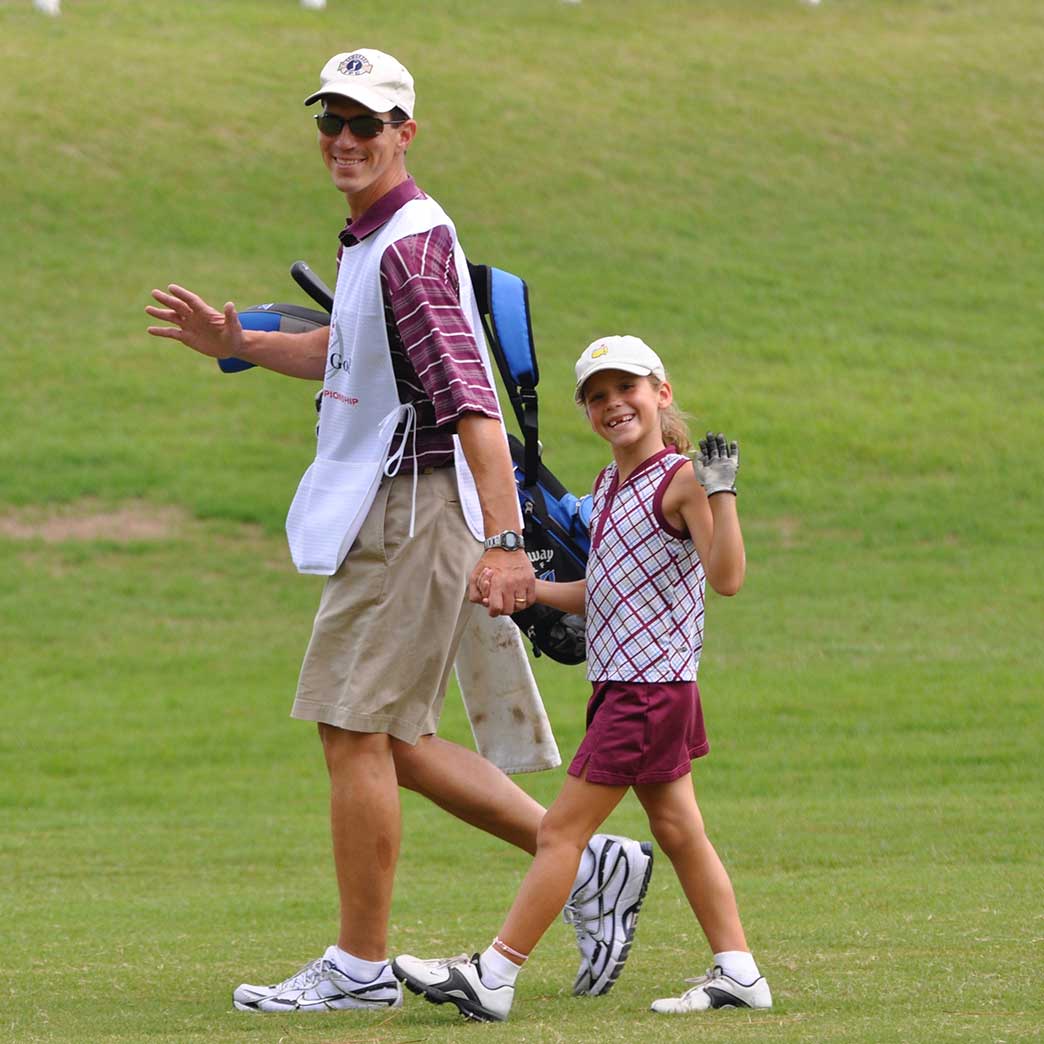
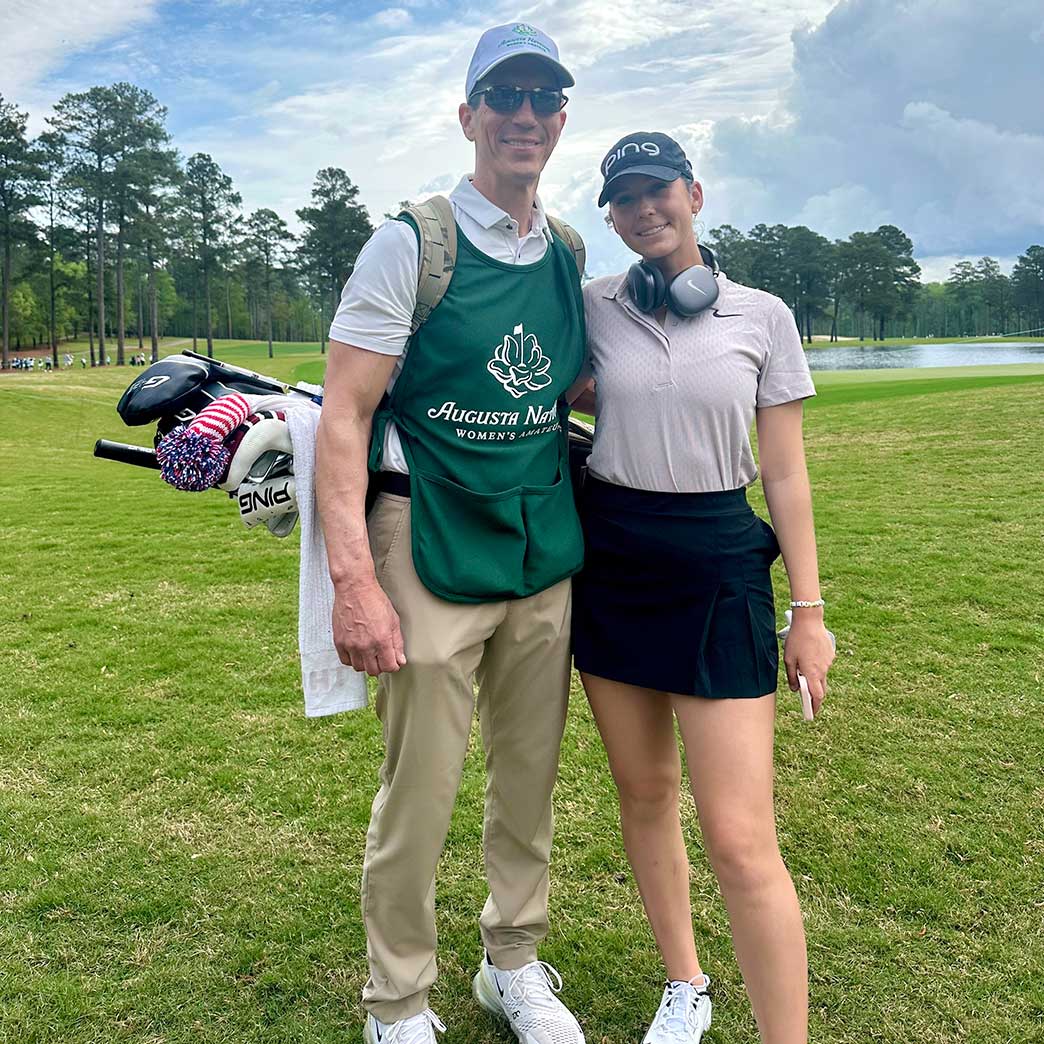
“That was the end of my golf career as I knew it, but absolutely the beginning of a new one,” Heck says from the range near Fort Meade. “Now I get excited to go play golf tournaments. I’m pumped about Augusta because it’s the first time that I’ve gotten to go to a tournament and not feel any pressure. I haven’t been practicing. I have another full life that has absolutely nothing to do with this game.
“I’m telling my boss I’m taking PTO and I’m going to Augusta, and it’s going to be awesome.”
Heck reaches into her bag and pulls out her favorite club, a 58-degree Ping wedge. In the old days, she’d spend hours around the practice green working on her chipping, letting the creative juices flow and manipulating the clubface to see how the ball flight would change. Now, she’s taking three-quarter swings.
It looks easy; she’ll tell you the journey wasn’t.
“I’m so blessed for everything golf has given me. At the same time, I’m proud of myself to be able to step away from the game,” she says. “I love life now. It’s a lot quieter. It’s very busy, but it really feels like mine. I’m doing what I want to do.”
She puts her club away, hoists her bag over her shoulder and walks to her car. A half-dozen balls remain in her bucket, but she didn’t want to hit them.
Rachel Heck knows when enough is enough.
The post Rachel Heck didn’t need pro golf. She wanted something more appeared first on Golf.